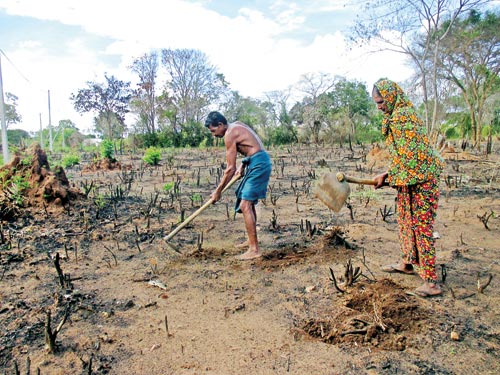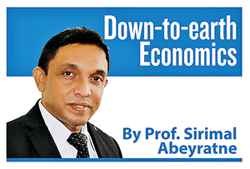Price of division and isolation!
View(s):
How wonderful would it be if farmers from the south have excellent relationships with those in the north!
“The universities taught in three languages: Sinhalese to the majority, Tamil to the Jaffna Tamils, and English to the Burghers. At the university in Kandy, I had asked the Vice Chancellor how three different engineers educated in three languages collaborated in building one bridge.”
The above is a remark made by the late Prime Minister of Singapore, Lee Kuan Yew, some 60 years ago about the economic outcome of Sri Lanka’s language policy. The remark was published on page 463 of his book “From Third World to First: The Singapore Story 1965-2000”.
The language policy made the Sri Lankan society divided internally and isolated from the rest of the world. Over the years and decades, divisions and isolation play a major role in blocking the nation from achieving both economic development and political stability. Today, the nation has been broken economically and politically, which has also made it subservient to external powers. Besides, the nation still struggles for reconciliation by healing its historical wounds, which would further delay its economic progress.
Before I continue, let me complete the rest of the comment on this issue by Lee Kuan Yew. First, he explained his view about the Vice Chancellor, and then his reply: He – the Vice Chancellor – was a Burgher and wore a Cambridge University tie so that I would recognise he had a ‘proper PhD’.
In response the Vice Chancellor said: “That Sir is a political question for the ministers to answer.”
Lee Kuan Yew asked about the availability of international textbooks in Sinhalese and Tamil. The Vice Chancellor replied that basic textbooks were translated from English into Sinhalese and Tamil, but always three to four editions late by the time they were printed. I am not sure today, how many international textbooks in many different subject areas are translated, even if it is late by three to four editions. Divisions led to isolation!
Rhetoric and harsh reality
In the 1990s during the height of the war at home in Sri Lanka, while I was engaged in my postgraduate studies in Holland, I met a Tamil youth who travelled from Norway. Like myself, he was also in his 30s. One of my friends, who had arranged this meeting in advance had already told me that he was a LTTE member.
Therefore, I knew whom I was going to meet, while after I met him, he too straightaway identified himself as a LTTE member. But nevertheless, I was eager to see him – someone at my age from our home country!
 We spent hours at my friend’s home, speaking in English. In fact, he wanted to meet me to ask my help for his studies for a Masters’ degree in Norway. His research was about the Sri Lankan economy, for which he didn’t have any data and foundational materials. How could he, when he had barely escaped the battleground saving his life and reaching Europe?
We spent hours at my friend’s home, speaking in English. In fact, he wanted to meet me to ask my help for his studies for a Masters’ degree in Norway. His research was about the Sri Lankan economy, for which he didn’t have any data and foundational materials. How could he, when he had barely escaped the battleground saving his life and reaching Europe?
At the time of bidding farewell, he said something that shocked me: “Although we lived in one country, you are the first Sinhalese that I have ever spoken to in my life”. I told my supervisor, late Professor Peter Kloos about our meeting. He said that “when you meet as individuals from the same home country even for the first time, that bondage with many common things in the heart to share, it would outweigh all those political cracks”.
Our discussion was a friendly one, but he left one heart-breaking thought for me to ponder for many years, in fact to-date. He firmly believed and freely expressed that Tamils in Sri Lanka would have no future without separating from the Sinhalese!
I am not arguing for or against what he said, but the question is who would have cultivated that mistrust among our native communities representing the Sri Lankan nation. And, in doing so what have we achieved so far other than leading the nation to an unprecedented economic crisis and political instability?
Reaping the fruits
We reap, as we sow. Today, we are still reaping the fruits of what we have planted in the past. The nation is divided, and the divisions start in the school from our childhood. Most of the schools are divided according to language, ethnicity and religion.
Children didn’t learn each other’s language as there was no effective mechanism for teaching the local languages and promoting the formation of ‘mixed’ schools with children from all communities. As a result, many Sinhalese don’t know Tamil, and many Tamils don’t know Sinhala.
Two of the notable positive developments that I have seen in two locations: Although it is on a small scale, the universities and international schools have been seen with mixed classes of students from Sinhala, Tamil and Muslim communities. It is a commendable development that Jaffna University leads admitting nearly half of its student population from the Sinhalese community and teaching them.
Many government agencies in the South communicate with citizens in the Sinhala language only and those in the North in Tamil language only. This is a country with only three languages, but the country’s language policy forced our majority adults to learn only one language, which is their own mother tongue.
Isolation from the world
Language policy has not only created a divided nation, but also transformed it to an isolated nation. Although the world has been changing rapidly, a nation with majority people who are confined to understand only in their local languages, have a limited exposure to the outside world.
In this case, Tamil language which is the 20th most spoken language in the world by over 80 million people still has an advantage of a bigger market size spread all over the world. The size of the market is a major determinant of the progress of an economic activity, including communication media and textbook publication.
Given this economic reality, we in Sri Lanka are overwhelmingly cut off from the rest of the world in terms of our ability to comprehend the changing world. Perhaps, we tend to think what we know in the world as well as world economic and political affairs. It could lead to an undesirable national outcome, when the democratic values such as freedom of speech and protest are exercised in a divided and isolated society.
Our policy reform process failed for many years reversing the economic progress because we increasingly valued our division and isolation. Today we wonder whether all types of evils – corruption, crimes, indiscipline, unaccountability and many others – are all due to the open economy. Many of the open economies in the world have not brought up such evils as an integral part of their economic systems.
Unity in diversity
Sri Lanka has paid a heavy price for its internal division and external isolation in terms of its economic and political catastrophe. The country still continues to struggle in finding ways to come out of its economic and political impasse.
Diversity is our strength, while diversity exists in a compact piece of land even in terms of its people, history and culture. At a time of revisiting reconciliation and restoration, we must remember that ‘diversity’ has been the nation’s weakest point rather than to be the advantage of the nation.
Our 1977 policy reform process started to move in the reverse direction due to the conflicts that we nurtured during our post-independent history, until it was almost abandoned after the mid-1990s. It is difficult for Sri Lanka to afford to another round of conflict, and to move forward without establishing the unity in its diversity. (The writer is a former Professor of Economics at the University of Colombo and can be reached at sirimal@econ.cmb.ac.lk and follow on Twitter @SirimalAshoka).
Hitad.lk has you covered with quality used or brand new cars for sale that are budget friendly yet reliable! Now is the time to sell your old ride for something more attractive to today's modern automotive market demands. Browse through our selection of affordable options now on Hitad.lk before deciding on what will work best for you!



